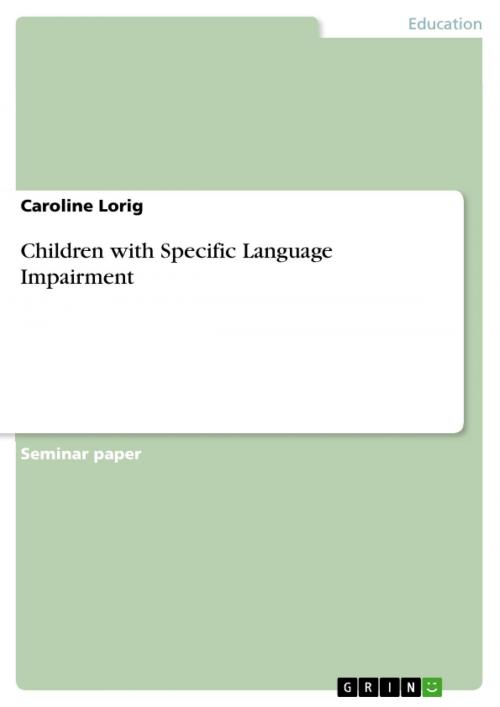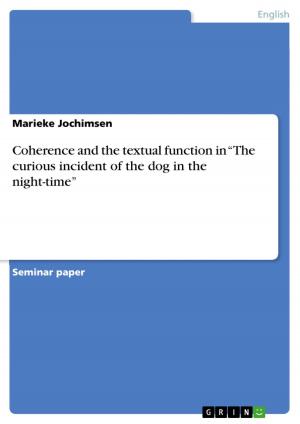Children with Specific Language Impairment
Nonfiction, Reference & Language, Study Aids, ESL, Foreign Languages| Author: | Caroline Lorig | ISBN: | 9783638016247 |
| Publisher: | GRIN Publishing | Publication: | March 3, 2008 |
| Imprint: | GRIN Publishing | Language: | English |
| Author: | Caroline Lorig |
| ISBN: | 9783638016247 |
| Publisher: | GRIN Publishing |
| Publication: | March 3, 2008 |
| Imprint: | GRIN Publishing |
| Language: | English |
Seminar paper from the year 2007 in the subject English - Pedagogy, Didactics, Literature Studies, grade: 2,3, University of Cologne, course: Second Language Learning Theories, 10 entries in the bibliography, language: English, abstract: Introduction The infantile language acquisition is, under normal circumstances, a quick as well as robust event in every child's life. Naturally, a child is able to acquire the language it is surrounded by rather easily, effortlessly and successfully. After all, it usually leads to accurate and fluent language habits which are not impaired in any way. 'In most children, normal language development depends on opportunity, good hearing and the absence of underlying neurological problems' (Warwick 2003, p.11). If, on the other hand, the infantile development is impaired, e.g. due to cognitive, social-emotional or sensory deficits, the language acquisition may often be affected, too. Apart from this, there are many children (approximately 15%) who do not use more than 50 words and barely any elaborate word combinations when they are two years old, even though they don't show any primary impairments (cf. Dannenbauer 2003). No apparent reason for their delayed language development can be found. Still, not less than half of these so-called 'late talkers' are able to (linguistically) catch up with their peers in pre-school age (cf. ibd.). However, the other part of those 'late talkers' can reveal compact and persistent deficiencies in their receptive and/ or expressive use of language without showing any primary impairment such as mental retardation or another disability. Even so, these children remain behind their contemporaries in their language comprehension as well as language production. Individual children whose language is impaired in that way, in spite of being cognitively 'normal', are diagnosed with 'Specific Language Impairment'. This paper will deal with this language disorder and try to show an outline of this phenomenon.
Seminar paper from the year 2007 in the subject English - Pedagogy, Didactics, Literature Studies, grade: 2,3, University of Cologne, course: Second Language Learning Theories, 10 entries in the bibliography, language: English, abstract: Introduction The infantile language acquisition is, under normal circumstances, a quick as well as robust event in every child's life. Naturally, a child is able to acquire the language it is surrounded by rather easily, effortlessly and successfully. After all, it usually leads to accurate and fluent language habits which are not impaired in any way. 'In most children, normal language development depends on opportunity, good hearing and the absence of underlying neurological problems' (Warwick 2003, p.11). If, on the other hand, the infantile development is impaired, e.g. due to cognitive, social-emotional or sensory deficits, the language acquisition may often be affected, too. Apart from this, there are many children (approximately 15%) who do not use more than 50 words and barely any elaborate word combinations when they are two years old, even though they don't show any primary impairments (cf. Dannenbauer 2003). No apparent reason for their delayed language development can be found. Still, not less than half of these so-called 'late talkers' are able to (linguistically) catch up with their peers in pre-school age (cf. ibd.). However, the other part of those 'late talkers' can reveal compact and persistent deficiencies in their receptive and/ or expressive use of language without showing any primary impairment such as mental retardation or another disability. Even so, these children remain behind their contemporaries in their language comprehension as well as language production. Individual children whose language is impaired in that way, in spite of being cognitively 'normal', are diagnosed with 'Specific Language Impairment'. This paper will deal with this language disorder and try to show an outline of this phenomenon.















